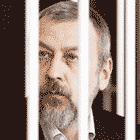 States urged to heighten sanctions against Europe’s last dictator as opposition leader tells of fears. Michael Harris reports
States urged to heighten sanctions against Europe’s last dictator as opposition leader tells of fears. Michael Harris reports
German MP Marina Schuster told a packed session of the Council of Europe’s Parliamentary Assembly that former Belarus presidential candidate Andrei Sannikov is close to death after being tortured in jail. Schuster told the Assembly that there is now a “serious risk he may die”, using information passed on by Index from a press conference held concurrently in Minsk.
Irina Khalip, Sannikov’s wife, visited him in jail yesterday. It was her first permitted visit since August last year. In an emotional meeting in the presence of KGB officers, Sannikov used a pre-arranged code to express his fear of never seeing his family again. He added that the physical and psychological torture was constant — not daily, but hourly. Khalip said that Sannikov was extremely frail, and even though the KGB stated there would be reprisals for reporting details of her visit, she went public at a press conference today, as she believes her husband will die in jail without international action. There are also fears that Sannikov’s family may be targeted.
At the Council of Europe Parliamentary Assembly this morning, delegates passed a strong draft opinion written by rapporteur Andres Herkel. All political groups backed the opinion that called for:
– the Belarusian authorities to release and rehabilitate all political prisoners, and;
– all member states of the Council of Europe to join the sanctions imposed by the European Union against Belarusian officials responsible for serious human rights violations.
Index on Censorship will be writing to Council of Europe member states to urge them to join the European Union sanctions, and remind Belarus of its international obligations, alongside member states such as Norway who have already done so.
Whilst there was almost unanimous support for this strong statement on Belarus, some former post-Soviet countries mindful of their own domestic human rights record attempted to water it down. An Armenian delegate described the debate as ‘hypocritical’ whilst their foe Azerbaijan remained within the Council of Europe. Later, Russian delegates stood up one by one to provoke the assembled parliamentarians with apologia for Lukashenko’s regime. Svetlana Goryacheva a Russian delegate from the Socialist Group spread Belarusian government propaganda about jailed human rights activist Ales Bialiatski, stating incorrectly he had received $300 million personally in donations from the West, adding that Western European countries and the United States were “war-mongerers”. Leonid Slutsky, another Russian delegate, said of the widespread concern for Bialiatski, “[They] are sending a signal that if you are a human rights defender you can evade taxes.” Slutsky failed to mention that Bialiatski was sentenced under Belarus’s penal code, which makes any form of donations to domestic NGOs a criminal offence.
The Russian’s but incensed delegates especially those from Baltic former Communist countries. Lithuanian EPP delegate Emanuelis Zingeris voiced his concerns over the behaviour of the Russians and Armenians and said the ‘anti-democratic statements’ of the Eurasian states were not appropriate for Strasbourg. Fellow Lithuanian delegate Egidijus Varekis said the word “President” should be removed from in front of Lukashenko’s name in the opinion and replaced with “dictator”. He added, to applause:
“We talk about how we can live with Lukashenko, but not how we can live without Lukashenko… If we cannot live without this dictatorship then this says a lot about our democracies.”
Andres Herkel’s report which formed the resolution included Index on Censorship’s successful campaign with Free Belarus Now against banks that sold Belarusian government bonds.
The resolution finally passed 111 votes with 10 against and 6 abstentions; and the recommendations of the committee were passed by 119 votes, 10 against and 3 abstentions. It is thought the majority of the 10 against were from the Russian delegation.
Michael Harris is Index on Censorship’s Head of Advocacy





